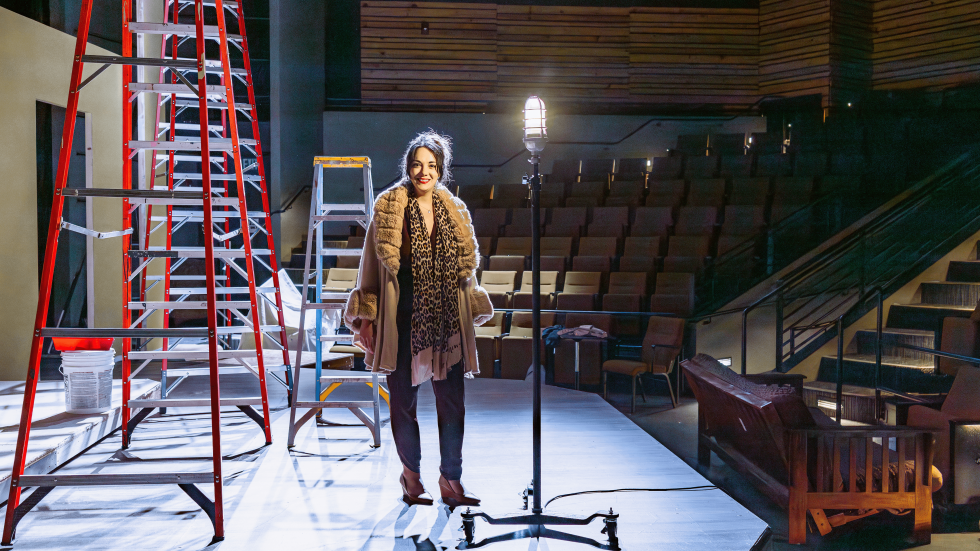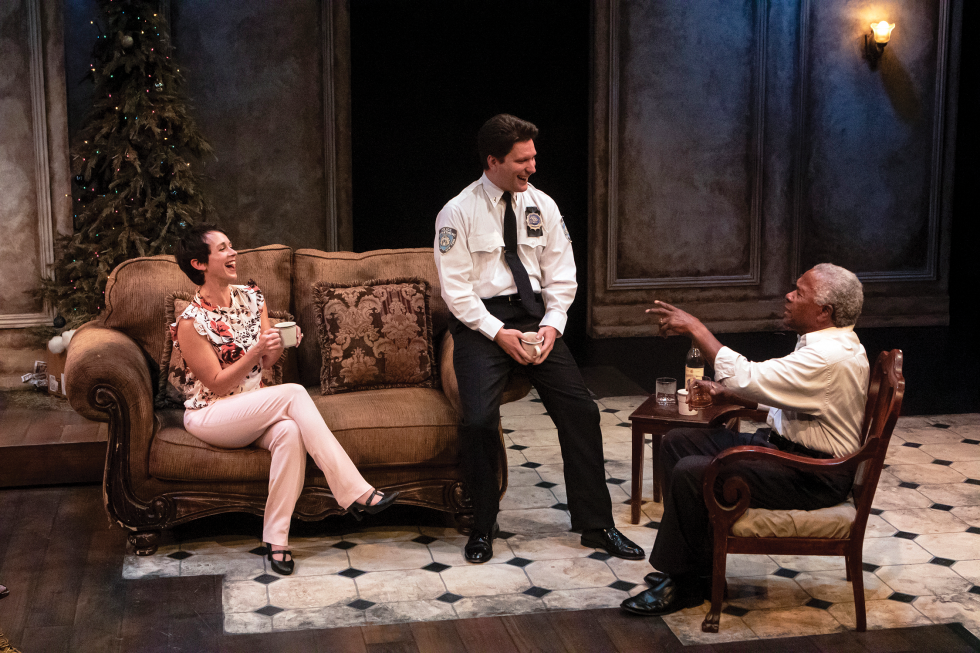When James Ellison III, who assumed the crown of artistic director of the theater nonprofit Celebration Arts in early 2023, is asked about how he chooses the first play of the season, he’s quite pragmatic.
“What we like to do is open up with a banger — with something that’s known, or that can get a lot of publicity,” says Ellison. “Then we know it will bring in enough revenue just in case the next show doesn’t do as well.”
This year, that “banger” took the form of “a play with music” (Ellison distinguished it from a traditional musical) called “Direct From Death Row — The Scottsboro Boys,” which kicked off the 2023 season. The play was a fitting choice for Celebration Arts, which describes itself as “Sacramento’s premier Black theater” and focuses on providing performing arts opportunities to underserved communities. This work takes a grim historical injustice — the imprisonment of nine Black boys and young men wrongfully accused of rape — and stages it with humor and affecting pathos, as when the actors playing prisoners become mothers bemoaning the fate of their boys.
“Let Sacramento change the world, we’re going to entertain it, and that’s the way we’re going to change the world.” Mike Jimena, managing director of the Theatre Production and Technical Academy at Sutter Street Theater
For playgoers, “Direct From Death Row” occupied about two thought-provoking hours of an evening or afternoon. But for the professionals who work to bring local plays to the stage, the planning and work begin months or even years before the curtain rises. Each production requires an army of artists, technicians, amateurs and volunteers, not to mention significant funds.
COVID-19 exposed the stark realities of the precarious economic state of the theater industry, but even regular theatergoers may not look past the glamour and drama of live theater to the grit, sweat and dollars that go into it. The Capital Region is lucky to have dozens of local theater companies (59 are members of the Sacramento Area Regional Theatre Alliance), each with its own way of keeping the lights on. Comstock’s went behind the scenes at a few local theaters to learn about the complex economics that keep the show going on.
Tickets Don’t Pay the Bills
As with most live performing arts, selling tickets alone won’t pay a theater’s bills. For the four theater companies interviewed for this piece, ticket sales account for about two thirds of the budgets. Alternative funding sources such as sponsorships and grants must be identified for the other third. Charitable donations, such as those that occur on Big Day of Giving, can also be key.
Lyndsay Burch, associate artistic director at B Street Theatre, had to do extra fundraising for bells and whistles such as the collapsing staircase called for in “The Play That Goes Wrong,” which must be rebuilt after every performance. She secured a corporate sponsorship through the Murphy Austin Adams Schoenfeld law firm. With a sponsorship, B Street gets the money to bring the show to Sacramento and the sponsor gets perks such as partial buyouts of the theater and brunch with the cast. Selling ads in the program can also bring in revenue.
Lyndsay Burch is the associate artistic director at B Street
Theatre. (Photo by Wes Davis)

For other sources of non-ticket funding, Mike Jimena, managing director of the Theatre Production and Technical Academy at Sutter Street Theatre in Folsom, credits co-founder Connie Mockenhaupt and her degree in English with helping to secure grants, including from the National Endowment for the Arts. He says they are a team in which he puts in the groundwork and she polishes it up. Sutter Street has even worked with people who have sponsored a show in exchange for a role in it, although Jimena stresses they don’t allow the art to suffer.
The COVID-19 lockdowns brought most theaters’ ticket revenue down to zero, and sales have not fully rebounded. Southern Methodist University Data Arts reported in 2022 that average ticket sales were at 75 percent of what they were pre-pandemic. Most theaters secured some type of relief grant. “There was money from the government, thank God,” says Artistic Director Michael Stevenson of Capital Stage, who calls his Managing Director Keith Riedell a “financial wizard.” Government grants “saved a lot of theaters,” Stevenson adds. “This next year will be even more challenging because I think the will for federal money has dried up.”
There’s still money available from other government sources, though. In March, Celebration Arts announced that it had received a California state grant for $715,000. “We heard that Assembly Member Kevin McCarty and his office were giving out funding and we actually just asked for the funds, for improvements for space, equipment and other costs,” says Ellison. “We will spread the spending of the funds out over a few years. They gave us exactly what we asked for, to the penny.”
And ticket sales continue to rebound: B Street reports a steady increase in sales from the 50 percent drop from pre-COVID levels upon reopening in August 2021. “Based on current projections, attendance and ticket sales will consistently reach what we were experiencing in 2019 around the spring/summer of 2024,” Burch says.
Jimena of Sutter Street Theatre, which pivoted to outdoor shows in 2020 and braved the elements from cold to wildfire smoke, reports that the theater’s financials are now quite strong. “Probably we’re as good post-COVID as we were before. If anything, maybe a little better.”
Cast, Crew, Set
One of the largest budget items for some theaters is actors’ and technicians’ pay, though that pay is not always enough to make a living wage. Ian Hopps, a Sacramento-based actor who typically acts in two shows a year for Capital Stage and Sacramento Theater Company, says that he “always has side jobs,” often in the restaurant industry. When reached by Comstock’s, he was in the middle of the Capital Stage run of “Heroes of the Fourth Turning,” a demanding show that runs over two hours with no intermission and requires Hopps to not only play drunk, but to fake-vomit in a shocking moment of emotional vulnerability.
Hopps says at Capital Stage, rehearsals usually run for about four 40-hour workweeks, and then performances run five days a week, including two on Saturdays. He is paid an average of $450 a week at Capital Stage and says that larger theaters such as Sacramento Theater Company pay “a couple of hundred more.” Health insurance is available, but coverage is based on the number of weeks an actor works for a company, so it won’t necessarily cover the full year.
Hopps is a member of the Actor’s Equity Association, a stage actors’ union formed in 1919. Union members get a guaranteed minimum salary, health care and pension, among other benefits. One stricture of membership is that he can’t act in non-union roles. B Street is “100 percent union”; Capital Stage has a commitment to 51 percent union contracts for both the actors and the technicians. Celebration Arts and Sutter Street rarely use union actors and cast members perform for nominal pay or purely as volunteers.
In addition to being one of the only fully union houses among local theaters, B Street is “the only theater with an acting company” in the area, according to Burch. Each member of the 10-actor company is guaranteed three roles each year. For those doing the math, that’s 30 roles per year guaranteed to company members out of 11 productions — factoring in some productions may only have two roles, and an actor likely can’t do main stage and family stage productions concurrently. Burch calls it “a complete puzzle.”
A theater’s payroll also extends to the professionals who take care of technical aspects, especially sets and staging. Stevenson of Capital Stage says lighting and sound workers are hired “on a show-by-show basis … so from an economic standpoint there’s a great deal of variability depending on the complexity.” He adds that pandemic-era supply chain issues affected the cost of raw materials for sets. “Lumber and steel has gone through the roof, so our costs have gone way up in that respect.”
Sutter Street saves on set costs because Jimena can build just about anything the stage can hold — he got his start as a scenic artist in the 1980s. This includes everything from creating a circus for the early internet-era “Dotties” awards for local websites at the Crest Theater to a life-size train for a conference at the SAFE Credit Union Performing Arts Center.
Securing the Rights
Another major budget item, perhaps overlooked by most theatergoers, is licensing fees. To secure the rights to a published work, a theater first must apply for a license to perform it through the publisher who owns it. This is true for every type of theatrical production, from a high school performance of “High School Musical” to a Broadway revival of “Into the Woods.”
Capital Stage often licenses Pulitzer Prize-winning plays, such
as “Between Riverside and Crazy” by Stephen Adly Guirgis. (Photo
by Charr Crail | Courtesy of Capital Stage)

If an application is accepted, which depends on factors such as the prominence of the theater and other theaters in the area which may have recently performed (or are planning to perform) the same work, the applicant is granted the privilege of paying to perform the theatrical or musical production. This can take the form of either a flat fee, or more frequently, a percentage of the profits, including a guaranteed minimum, even if no one shows up.
“I fill out the application, I give them the dates, and I give them estimates of gross box office,” says Stevenson of Capital Stage. “I send it away and then sometimes I get a response in a couple of days. Sometimes it can be a month or sometimes it’s a flat out no. … It’s a little bit of a mystery what happens in the black box.”
If you think the license grants rights to tinker with the dialogue, or do a gender switch of the main characters, think again. The website for Music Theatre International, which licenses the two aforementioned shows, contains many stern warnings for those who might try: “When you are granted a performance license by MTI, by law, the show you license must be performed ‘as is.’ You have no right to make any changes at all.” It goes on from there, further admonishing that everyone from the director to the owner of the building could be subject to liability and that this restriction extends to other factors such as logos and recordings.
This explains why daring reworks, such as a post-apocalyptic “Macbeth,” are often limited to plays that are old enough to be in the public domain, which are works that are not subject to copyright and can be used for free — in the United States, generally those published before 1928, or those whose author died more than 70 years ago.
B Street Theatre sidesteps the licensing process for many of its shows by being the only theater company in the region that focuses on bringing new works to the stage. This means that it’s the theater where the audience has the most power to influence the ultimate shape of the production, at least during the “preview” shows early in the run.
“When you are producing a new play, changes are coming in up to the eleventh hour. Cut this page, add this word, let’s move this here,” says Burch of B Street. “It’s never before been tested in front of an audience. The playwright and the director and actors are really taking seriously the feedback from the audience.”
The Play’s the Thing
But how do theater companies choose the plays they’ll license and produce? At Capital Stage, the selection process is based on a mission “to entertain, engage and challenge with bold, thought-provoking theater,” says Stevenson. “I like to think I want the audience to have a different experience every time they walk through the door.”
A near sold-out performance of “Heroes of the Fourth Turning” certainly achieves this. This critically acclaimed work is set in 2017, in the aftermath of the Charlottesville “Unite the Right” rally, as graduates of a conservative Catholic college discuss Trump, sex, shame and the culture wars late into a starry Wyoming night. The audience laughs, gasps and even cowers — when a jarring noise that may symbolize the rending of society, or God, or who knows what — reoccurs at unpredictable times. Afterwards, a buzzing crowd drifts out to their cars, some crowding around the exhausted actors on the sidewalk, heaping accolades on them and debating the moral questions the play raised.
Sutter Street Theatre has found success focusing on less challenging fare, according to Jimena. “Let Sacramento change the world, we’re going to entertain it, and that’s the way we’re going to change the world,” he says. This philosophy leads to its razzle-dazzle roster with productions of crowd pleasers such as “Cabaret” and “Spamalot.” “Maybe folks don’t want to be challenged every day and they want to be happy and sing and (be) entertained, and there’s a place for all of that.”
It’s a sentiment echoed by the title banger from one of Sutter Street’s upcoming shows: “What good is sitting all alone in your room? / Come hear the music play / Come to the cabaret, old chum / Come to the cabaret.”
–
Stay up to date on business in the Capital Region: Subscribe to the Comstock’s newsletter today.
Recommended For You

A Japantown Jazz Star Comes Home
1936 film starring Sacramento-born singer Betty Inada is screened in Sacramento
Betty Inada, a Japanese American jazz singer born in Sacramento in 1913, sought fame in Japan in a time when American screens and stages had little space for Asian women.

Share the Road
Can Sacramento become a safe, welcoming place for cyclists?
Despite a surge of cycling participation in the pandemic, focused spending on bike lanes, and geographical advantages, how is it that California’s capital is barely above average when it comes to bike infrastructure?




